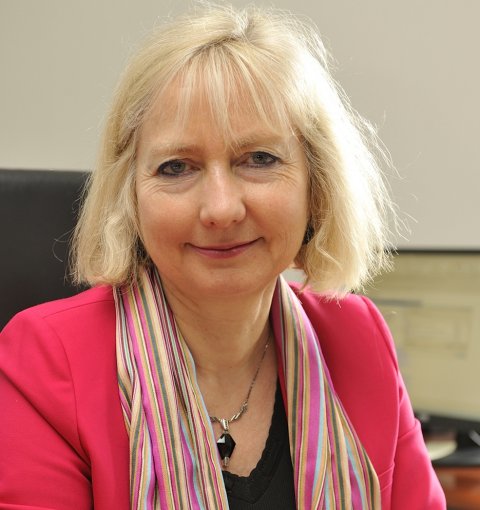Article • Females to the top
Go girl, go! Achieving gender equality in healthcare upper management
France has 32 hospital groups – two regional hospital groups (CRH) and 30 CHUs. Ranked among the 10 best hospitals in France, The Rennes University Hospital (Centre Hospitalier Universitaire [CHU] de Rennes) employs 7,700 people (the second largest employer in the region) and processes almost 1,500 hospitalisations every day. Untypically, since 2015 the general director has been female: Véronique Anatole-Touzet.
Interview: Jane MacDougall

‘When I was first appointed to a regional director position at the Metz-Thionville regional hospital in 2007,’ she said, ‘I was one of only two women to head a large hospital group.
‘Since I’ve been at Rennes, thanks to positive pressure to achieve equality in the upper management of government-run bodies, including healthcare, which started under President Hollande and is continuing under President Macron, consecutive health ministers have succeeded in bringing this number to 12, which is nearly 40%, and can be considered a great achievement.’
Why are so few women in these top positions?
‘One of the barriers to women obtaining a directorship is that the selection panels, who draw-up the short lists, are men. Department heads are men; only about 15-20% of higher management posts in hospitals are filled by women, so traditionally the lists of six candidates would be all male. However, that has changed legally now and equal numbers of men and women must be short-listed, which already puts women in a better position because they are at least considered for a position.’
Recommended article

Video • 'Women in Focus' at ECR
Getting to the top, staying feminine
Women continue to lead a rather marginal existence in medicine. Although there are now more female than male medical students, professorships and directorships are almost exclusively held by men. This imbalance was addressed with the lecture series ‘Women in Focus’ at the 2019 European Congress of Radiology (ECR).
With equal or higher numbers of women studying management and medicine, why do so many fail to reach the highest echelons of the profession?
At the end of the day, we are still a “Latin” culture with the undercurrent of machoism that accompanies it
Véronique Anatole-Touzet
‘The situation is not a straight forward numbers game. There are multiple reasons why women don’t get these positions. Women tend to be their own worst enemies. Broadly speaking, they are far more open to self-doubt then males in equivalent posts, they are the first to self-criticise and consider their efforts below the required standards. Blaming themselves for failure that is not of their making is also not uncommon. This is in addition to the fact that careers in higher management tend to open up when we are in our late 30s to early 40s. This coincides with the time that women have young children, possibly of school age but requiring care after school, too young to be left at home alone. Even with good childcare in place, women are openly criticised and made to feel guilty for abandoning their families for their careers. Or maybe they feel that by becoming a mother that is enough responsibility in their lives and they are happy to work fewer hours and not have the stress of upper management, as well as balancing home life, holidays and childcare against a background of hostility even if it is well hidden.’
How can we overcome this?
‘Women need to be sure of their abilities, educated to a similar level they are every bit as good as a man in a similar role. In fact, it could be considered – again broadly speaking – they may be better managers, more open to listening, less egotistical, better at compromise than their male counterpart, again I insist these are personal characteristics and there are men that display these characteristics and many women who are arrogant and poor listeners but on the whole these gender stereotypes do seem to exist in the hospital environment.’

Source: Shutterstock/Monster Ztudio
What can be done to improve things?
Improvement has to come from the whole environment. For a woman to succeed there has to be a support mechanism in place to allow her success. Not just in the workplace but at home; husbands need to support their partners to enable them to progress with their careers by taking on their share of home and childcare. We know from repeated reports that women still do the majority of this despite working full time.
‘France may be better than some countries in having more equality in terms of childcare facilities and men doing their share but, at the end of the day, we are still a “Latin” culture with the undercurrent of machoism that accompanies it. Also in a couple there has to be agreement, to climb to the top often means moving town, even region. This can again be exceedingly difficult without the support network needed from schools, childcare facilities, partners, family and friends. Things are changing, but slowly.
Ten or 15 years ago, sexist comments were commonplace and considered something women had to put up with. This is no longer the case
Véronique Anatole-Touzet
‘The only way to create a climate of true equality is for everyone to work together, men and women, to reduce the burden of guilt on the shoulders of a working mother. We can become more flexible in working hours, not organising meetings for late afternoon; being understanding when a woman needs time off for childcare/illness etc. Flexibility in the working day/week even, allowing women to have the time needed to retain the correct balance between personal and professional life. Within the hospital, teams should think about each other, cover for one another and step up when needed. This requires education of men primarily, to consider their role in family life, but also other women to be helpful and non-critical of a colleagues needs.
‘There is also the ‘me-too’ movement which has changed the way women are treated in the workplace. Men are, as a rule, more respectful of their female colleagues, sexual innuendo and misplaced comments (however, jokingly implied) are no longer tolerated. In fact, many of the younger generation of men in the medical profession would not dream of behaving in such a way. Ten or 15 years ago, sexist comments were commonplace and considered something women had to put up with. This is no longer the case. Any disrespectful behaviour is sought out and stopped at source, however senior the perpetrator.’
Recommended article

News • Working environment
UK female surgeons report discrimination
More than half of female surgeons in the UK have faced or witnessed discrimination in the workplace, suggest the results of a confidential online poll, published in the online journal BMJ Open. Orthopaedics was seen as the most sexist of all the surgical specialties, the responses showed.
What advice would you give the new generation of directors?
‘Dare. Have the confidence to step up and seize what’s available to you. It will be hard but, rather than stop in an assistant director post, learn and move on. You can do it, go girl!’
Profile:
A graduate of the Institute of Political Studies of Paris and the School of Advanced Studies in Public Health, Véronique Anatole-Touzet worked, from 1986 to 1998, for the Public Hospital Group in Paris (APHP). There she contributed to the development of the group’s strategic plan, before serving as Director of Finance and Information Systems at the Bicêtre CHU. Still with the APHP, she was promoted to Head of Department for Foresight and Employment, before taking up management of the Eure-Seine Intercommunal Hospital, in Higher Normandy. From this position, she was appointed General Director of the Metz-Thionville Regional Hospital Centre in 2007 and then finally, to her current role as General Director of the University Hospital Centre in Rennes, in March 2015. She is also a Knight of the National Order of Merit and a Knight of the Legion of Honour.
16.07.2019





